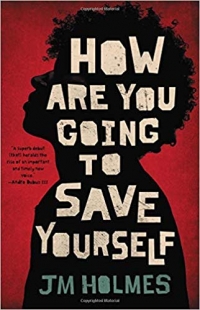How Are You Going to Save Yourself? by JM Holmes
 Friday, May 3, 2019 at 7:29AM
Friday, May 3, 2019 at 7:29AM 
Published by Little, Brown and Company on August 21, 2018
Taken collectively, the stories in How Are You Going to Save Yourself explore the lives of young black men growing up. A character named Gio, whose high school years are spent in Pawtucket, narrates many of the stories. Others spotlight his friends, Rolls, Dub, and Rye.
Gio’s father played in the NFL, but he left Gio’s mother and lived a less successful life by the time Gio was in high school. In “The Legend of Lonnie Lion,” Gio’s father advises him never to marry a white girl (presumably because that’s what his father did). The story offers a glimpse of Gio’s broken home, his troubled relationship with his father, and his ill-fated relationship with a Jewish girlfriend. “What’s Wrong With You? What’s Wrong With Me?” is a dialog-heavy story that consists of a conversation among Gio and his friends that keeps circling back to interracial sex. The heart of the story concerns their attempt to understand why a kid is turned on by racially offensive language that should offend him.
That conversation appears in the collection’s first story and is echoed in “Cookouts,” the final story. We learn in “Cookouts” that Gio did not take his father’s advice. The story focuses on Gio’s post-high school relationship with a white girl named Maddie, who comes from a prosperous family and lives in a world that is much different than Gio’s. The relationship changes in seconds when Gio introduces race into their sexual relationship in a way that understandably shocks Maddie, but race has always been a lurking subtext in their relationship. At least in Gio’s mind, the relationship was haunted by ghosts that Maddie never met.
In “Kinfolk,” Gio collects modest life insurance proceeds from his father’s death and watches the dollars disappear as he parties with his friends. In “Tacoma,” Gio struggles to understand whether anything still binds him to him to his stepmother and stepsister after his father’s death. He wonders whether he will lose his mother and stepsister because he is too much like his father.
“Be Good to Me” describes a girl’s first blowjob, one she was encouraged to give by a hand at the back of her head. The story then shifts to Rolls, who is trying (or not) to reconcile what he has learned (or not) in college with his self-serving beliefs about women. His attempt to apply what he learned about Kant’s philosophy of moral behavior to his life results only in confusion, as does his inability to separate his emotions from his lust. What happens next points to the ambiguity of so many unplanned sexual encounters, as neither the boy nor the girl are certain that they have any control over the situation, and both feel a sense of guilt. The story is a powerful look at what happens when people of both sexes act because they feel pressured, when they resist their own knowledge of the difference between right and wrong.
“Dress Code” explores the relationship of Dub, whose telemarketing job is going nowhere, and Simone, who hopes to improve her life when she accepts an offer to pose as an artist’s subject. This is one of my favorite stories in the volume, largely because of the tension it makes a reader feel as Dub and Simone both struggle with their self-esteem and as their lives move in different directions.
“Toll for the Passengers” is about a traffic accident that turns into extortion. But in the end, it’s about realizing that your life doesn’t need to be filled with drama, that your skin color doesn’t force you into needless confrontations. “Everything Is Flammable” demonstrates the tension between being street and being straight, the choice between a life of freedom that leads to prison or a life that is imprisoned by employment. The story suggests that every choice leads to risk.
It is the honesty in these stories, the unvarnished self-reflection, that makes them special. The stories span a period of years — long enough that when Gio goes back to the barbershop he frequented as a high school student, nobody remembers him — during which Gio and his friends change and mature, or don’t. The book’s title encapsulates its central theme: What changes can the characters make to save themselves in a changing world?
JM Holmes’ stories capture the confusion of coming of age, of choices made and friendships abandoned, of changing relationships with family members and lovers, and of changing times. He does that with striking prose: “I looked at the table legs, Serena Williams thick.” He tackles large social issues (like the conflict between Black Lives Matter and the police) through personal squabbles among family and friends. By telling small stories, Holmes brilliantly illuminates larger questions that continue to divide the country. Some of the stories make for brutal reading, but they are all the more vital because of that.
RECOMMENDED